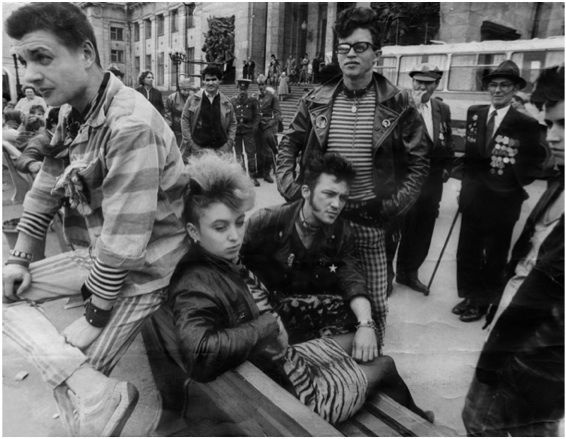
Punk in the Soviet Union
Every big movement touches every corner of the world eventually, it didn’t reach the Soviet Union that fast, but punk certainly found a home in the youth of that place in the late 70s. At the moment there were two choices to go with be disco or be punk.
The obvious choice for most young people was punk since there was message that was deeply understood given the context of the Soviet Union, an that was a message of

Although the nascent Soviet Punk movement took on the ideals of the English scene, it moved toward the harsh intensity of the Washington D.C. hardcore/straightedge scene. The movement of Soviet Punk toward hardcore came as a reflection of the physical and political environment, incorporation of distinct instrumentation, and adoption of distinct hardcore values (such as abstention from alcohol).
Pág. 5
It was made a movement by soviet union that resonated with the political state in which they were at the time, while it was at a personal level, the punk movement was also a political one.
The political history most relevant to the punk movement in the Soviet Union began with the Stalinist era, continuing through to the stagnation era of Leonid Brezhnev. Throughout this period, the political and societal structure crafted by Iosif Stalin, Nikita Khrushchev, and Leonid Brezhnev provided the framework on which the punk movement revolted. It furthermore contributed to the development of the protopunk subculture of the late 1970s era called the “unclassifiables
Grazhdanskaya Oborona
One of those punk bands was Grazhdanskaya Oborona, a band that formed in the early 80s and can be a good example as a Soviet Union punk band that showed the world a moral of the youth that was not very happy with how things were. The mother of the second guitarrist even thought that the band was an anti soviet movement and went to the KGB to report them.
The band leader Yegor Letov, was drafted despite having heart conditions, and it wasn’t until 1986 that he was released, at this time he went straight back to making music and record.
There are clear influences of other punk bands from the US and the UK but at the same time there is a heavy rythm and a strange voice that goes from clean singing to a raw scream like singing.
They also made some compositions a bit more melodic and more “traditional” in a way. That is not to say that punk was traditional, but the sense as we know the most famous bands. To many people
Alexei Borisov
Alexei Borisov a specialist on the subject said in an interview:
Even if the codes of punk and post-punk were introduced very late in the Soviet Union, the impact of punk on musicians and listeners was huge. A young generation raised on original, refined classical music and a usually very simple, banal pop or jazz-rock in official broadcasts and official art production were suddenly stepping inside this new world with the charm of the word “forbidden” written on the door (and most likely some hidden efforts from West). However, they were unaware that they were moving towards a sensation that would once again surpass the West.
Alexei Borisov

In the end it’s important to give some time to research about those places and music that have quite a strong history but you wouldn’t really think about. Soviet punk is a very strong case, where the nature of it was very agressive sometimes, but in the end it was a very pure and honest way to make art.
This is just another example of how music is a universal language, but also a language that changes and adapts.
